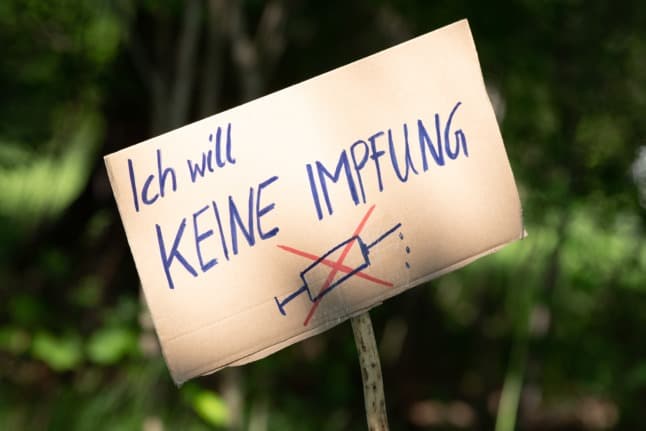What employees in Germany should know about quarantine compensation

Germany's state health ministers have agreed to scrap quarantine compensation for unvaccinated employees from November 1st. Here's what you need to know.
So far in the Covid pandemic, the German state has stepped in to reimburse lost earnings for those who have to go into quarantine - but a number of states have long been unhappy with this.
READ ALSO: Unvaccinated workers in Germany could lose pay if ordered into quarantine
In September, the state health ministers agreed to go back to existing legislation that allows them to cut off reimbursements for those who choose not get vaccinated. So, what new rules come in on November 1st? Here's what we know so far.
Which cases of quarantine are we talking about?
If you've potentially come into contact with an infected person and might have contracted Covid, your local health authority can order you to go into quarantine - meaning you can't go into the office or workplace.

If you get contacted by your local health ministry after visiting a venue that had a Covid breakout, you may have to quarantine. Photo: picture alliance/dpa/dpa-Zentralbild | Jens Büttner
This is increasingly becoming an issue for people who have not yet been vaccinated, since the requirement to go into quarantine generally doesn't apply to those who've got their jabs.
Who has paid the compensation so far and who has received it?
So far, workers who have suffered financial losses from having to go into quarantine can get compensation from the government. In concrete terms, the employer makes an advance payment to the employee and can then apply to have the money reimbursed by the state.
As the Federal Ministry of Health explains, full compensation can be granted for up to six weeks. At the beginning of the seventh week, the employee receives up to 67 percent of the loss of earnings, with a cap of €2,016 for the full month of work.
What changes are being made?
Germany's Infection Protection Act already contains exceptions for non-vaccinated people - it has just hasn't been applied yet.
Specifically, it states that there is no entitlement to compensation if quarantine could have been avoided by a publicly recommended vaccination. The same applies if one has made an "avoidable trip" to a Covid risk area with high infection rates abroad and must then go into quarantine after returning.
Germany will now enforce this rule nationwide from November 1st, 2021.
What's the argument against compensation?
A bit like the decision to scrap free rapid tests, those in favour of getting rid of compensation for these 'avoidable' quarantines say that everyone who wants one will by now have had a chance to get their Covid shots. If they choose not to take the offer, why should the state continue to finance their time off work?
Bavaria's head of department Klaus Holetschek, who also happens to be chairman of the health ministers' conference, is one of the prominent politicians taking this view. Speaking to ARD in September, he said he saw no reason why compensation costs had to be shouldered by the taxpayer if there were no health reasons against vaccination.
READ ALSO: Doctors in Germany can continue to grant sick leave by phone
Federal Health Minister Jens Spahn (CDU) agrees. "I don't see why others should pay in the long run if someone doesn't opt for free vaccination even though they could," he told DPA.
Were any states doing this before November?
Yes, they were. States are ultimately free to go their own way on issues like this, though the ideal situation is that they all manage to agree on a united front - which is what Wednesday's meeting will be all about.
So far, Baden-Württemberg's has been the only state to stop compensation for the unvaccinated. This rule came in on September 15th, with the state government explaining that by mid-September everyone had had a chance to be vaccinated.
There are, of course, exceptions for people who can't get vaccinated due to medical reasons - which might people who have had cancer treatment and others with illnesses that impact their immune systems.
On October 1st, Rhineland-Palatinate followed Baden-Württemburg in implementing the new rule, while Bremen and North Rhine-Westphalia also changed their legislation in October.
READ ALSO: German vaccine panel to recommend Covid jabs for pregnant women
But what if someone actually gets ill with Covid?
That's a different matter entirely.
"It is about wage compensation for contact persons of infected persons in quarantine - not about continued payment of wages in case of illness," a spokeswoman for the Federal Ministry of Health told DPA. "Anyone who becomes infected is sick and is entitled to it."
So if a worker falls ill with Covid-19, he or she will continue to be paid - even if unvaccinated.
Is anyone criticising the move?
As with all decisions to remove certain rights or privileges from the unvaccinated, the move is naturally controversial.
Reiner Hoffmann, president of the German Federation of Trade Unions (DGB), had strong words to say about the states forging ahead with the change.

Reiner Hoffmann, president of the German Federation of Trade Unions, believes that the changes could have far-reaching implications to labour laws in Germany. Photo: picture alliance/dpa | Marius Becker
The decision to scrap reimbursement amounted to "compulsory vaccination through the back door," he told Deutschlandfunk. In his view, the conflict over compulsory Covid vaccination could end up being shifting into the realm of industrial relations - with far-reaching consequences for Germany's labour laws.
How many people could this affect?
According to the latest government data, as of Monday, 66.7 percent of people in Germany were fully vaccinated, while 69.4 percent had been given at least one dose.
However, this is the figure for the entirely of the population - which includes a large number of people who aren't of working age. In the 18-59 year old age bracket, around 73 percent of people are fully vaccinated, while 85.3 percent of over-60s are.
Since people generally work until their mid-60s in Germany, we can assume that just under a quarter of working-age people might be affected by the change.
Comments
See Also
So far in the Covid pandemic, the German state has stepped in to reimburse lost earnings for those who have to go into quarantine - but a number of states have long been unhappy with this.
READ ALSO: Unvaccinated workers in Germany could lose pay if ordered into quarantine
In September, the state health ministers agreed to go back to existing legislation that allows them to cut off reimbursements for those who choose not get vaccinated. So, what new rules come in on November 1st? Here's what we know so far.
Which cases of quarantine are we talking about?
If you've potentially come into contact with an infected person and might have contracted Covid, your local health authority can order you to go into quarantine - meaning you can't go into the office or workplace.

If you get contacted by your local health ministry after visiting a venue that had a Covid breakout, you may have to quarantine. Photo: picture alliance/dpa/dpa-Zentralbild | Jens Büttner
This is increasingly becoming an issue for people who have not yet been vaccinated, since the requirement to go into quarantine generally doesn't apply to those who've got their jabs.
Who has paid the compensation so far and who has received it?
So far, workers who have suffered financial losses from having to go into quarantine can get compensation from the government. In concrete terms, the employer makes an advance payment to the employee and can then apply to have the money reimbursed by the state.
As the Federal Ministry of Health explains, full compensation can be granted for up to six weeks. At the beginning of the seventh week, the employee receives up to 67 percent of the loss of earnings, with a cap of €2,016 for the full month of work.
What changes are being made?
Germany's Infection Protection Act already contains exceptions for non-vaccinated people - it has just hasn't been applied yet.
Specifically, it states that there is no entitlement to compensation if quarantine could have been avoided by a publicly recommended vaccination. The same applies if one has made an "avoidable trip" to a Covid risk area with high infection rates abroad and must then go into quarantine after returning.
Germany will now enforce this rule nationwide from November 1st, 2021.
What's the argument against compensation?
A bit like the decision to scrap free rapid tests, those in favour of getting rid of compensation for these 'avoidable' quarantines say that everyone who wants one will by now have had a chance to get their Covid shots. If they choose not to take the offer, why should the state continue to finance their time off work?
Bavaria's head of department Klaus Holetschek, who also happens to be chairman of the health ministers' conference, is one of the prominent politicians taking this view. Speaking to ARD in September, he said he saw no reason why compensation costs had to be shouldered by the taxpayer if there were no health reasons against vaccination.
READ ALSO: Doctors in Germany can continue to grant sick leave by phone
Federal Health Minister Jens Spahn (CDU) agrees. "I don't see why others should pay in the long run if someone doesn't opt for free vaccination even though they could," he told DPA.
Were any states doing this before November?
Yes, they were. States are ultimately free to go their own way on issues like this, though the ideal situation is that they all manage to agree on a united front - which is what Wednesday's meeting will be all about.
So far, Baden-Württemberg's has been the only state to stop compensation for the unvaccinated. This rule came in on September 15th, with the state government explaining that by mid-September everyone had had a chance to be vaccinated.
There are, of course, exceptions for people who can't get vaccinated due to medical reasons - which might people who have had cancer treatment and others with illnesses that impact their immune systems.
On October 1st, Rhineland-Palatinate followed Baden-Württemburg in implementing the new rule, while Bremen and North Rhine-Westphalia also changed their legislation in October.
READ ALSO: German vaccine panel to recommend Covid jabs for pregnant women
But what if someone actually gets ill with Covid?
That's a different matter entirely.
"It is about wage compensation for contact persons of infected persons in quarantine - not about continued payment of wages in case of illness," a spokeswoman for the Federal Ministry of Health told DPA. "Anyone who becomes infected is sick and is entitled to it."
So if a worker falls ill with Covid-19, he or she will continue to be paid - even if unvaccinated.
Is anyone criticising the move?
As with all decisions to remove certain rights or privileges from the unvaccinated, the move is naturally controversial.
Reiner Hoffmann, president of the German Federation of Trade Unions (DGB), had strong words to say about the states forging ahead with the change.

Reiner Hoffmann, president of the German Federation of Trade Unions, believes that the changes could have far-reaching implications to labour laws in Germany. Photo: picture alliance/dpa | Marius Becker
The decision to scrap reimbursement amounted to "compulsory vaccination through the back door," he told Deutschlandfunk. In his view, the conflict over compulsory Covid vaccination could end up being shifting into the realm of industrial relations - with far-reaching consequences for Germany's labour laws.
How many people could this affect?
According to the latest government data, as of Monday, 66.7 percent of people in Germany were fully vaccinated, while 69.4 percent had been given at least one dose.
However, this is the figure for the entirely of the population - which includes a large number of people who aren't of working age. In the 18-59 year old age bracket, around 73 percent of people are fully vaccinated, while 85.3 percent of over-60s are.
Since people generally work until their mid-60s in Germany, we can assume that just under a quarter of working-age people might be affected by the change.
Join the conversation in our comments section below. Share your own views and experience and if you have a question or suggestion for our journalists then email us at [email protected].
Please keep comments civil, constructive and on topic – and make sure to read our terms of use before getting involved.
Please log in here to leave a comment.